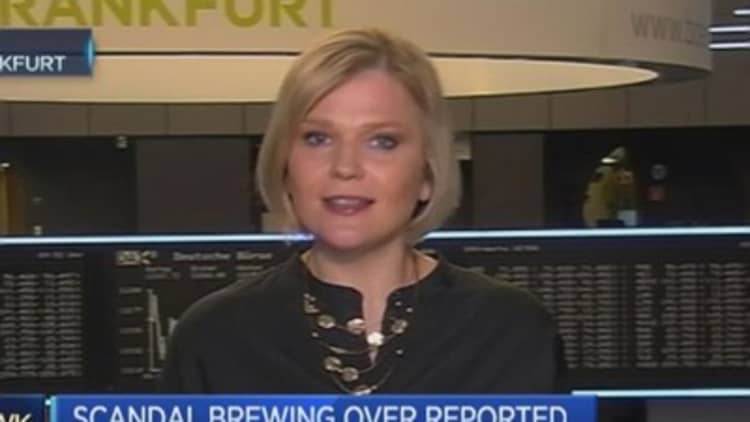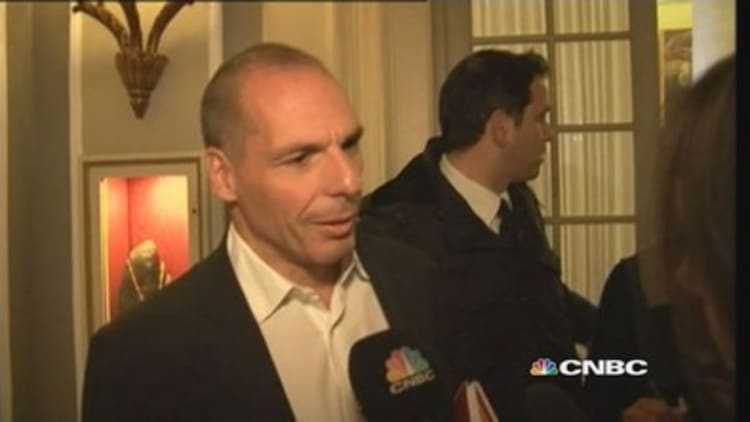


As frustration mounts with the Greek government's combative stance in negotiations over its place in the euro zone, new data shows the majority of Germans are happy to let Greece quit the single currency.
According to a poll by Germany's YouGov published Tuesday, public opinion in the euro zone's largest economy has turned against its southern euro zone neighbor dramatically over the last month.
The number of Germans in favor of a so-called "Grexit" rose from 48 percent to 59 percent between mid February and mid-March, when an online survey of 1,012 people was conducted by YouGov.de.
Meanwhile, the number of Germans in favor of Greece remaining within the euro zone declined from 34 percent in February to 23 percent in March.
The poll was conducted between February 11-13 to March 13-16, YouGov said on its German website, a period of increasingly tense relations between Greece and Germany, and the wider euro zone.
In particular, the poll comes as tensions between Greece and Germany become increasingly fraught with arguments between Greek Finance Minister Yanis Varoufakis and his German counterpart, Wolfgang Schaeuble, played out in the public eye.
Over the last few days, allegations that Varoufakis "gave the finger" to Germany have hit the headlines, although in the last few weeks both sides have accused each other of being "insulting" during recent negotiations to extend Greece's bailout program by four months.
Read MoreGreek, German tensions rise amid swearing claims
Greece has been the recipient of two bailouts worth 240 billion euros ($252 billion) which have been overseen by the "troika" of international organizations, the European Central Bank, European Commission and International Monetary Fund.
Fiscally-disciplined Germany has been pushing austerity as a way to bring the euro zone's economy back on track, making Berlin the target of Greek anger from both the public and politicians. Conversely, the German public are angry at what they see as insults and ingratitude from Greece when they have been the country's largest euro zone creditor.
Read MoreGreek Finance Minister Varoufakis: I try not to be liability
Since the new left-wing government under Prime Minister Alexis Tsipras came to power in January, those feelings have intensified, particularly as Tsipras and his party have sought to change bailout terms and obligations.
As such, the prospect of the "Grexit" has returned to the fore, according to Daniele Antonucci, European economist at Morgan Stanley.
"Contrary to many commentators, we don't think that the probability of a euro exit has diminished," Antonucci said in a note Tuesday, adding that Morgan Stanley put the probability of a Grexit at one in four over the next six months.
"Greece's situation is deteriorating rapidly. The economy is now shrinking, tax revenues are falling short of targets, bank deposits are leaving the system and political volatility seems on the rise, both domestically and in the relations with official lenders. The chance to see a quick compromise has diminished."
Read MoreGreece lashes out as pressure to reform rises
The economic and financial tensions have been matched by an increasingly frosty political atmosphere as Greek Prime Minister Alexis Tsipras' appears to becoming increasingly isolated in Europe.
"The Greek government faces a dire financial situation in the coming weeks, especially as lenders are unlikely to relent on the conditions of last month's loan extension," Wolfango Piccoli, managing director of risk consultancy Teneo Intelligence said in a note Tuesday.
"Leaving aside the cash crunch challenge, the government's nationalist strategy is setting the stage for a period of intense turmoil and uncertainty," he added, saying that Tsipras' lack of experience in power was starting to show as he faces a divided party at home and isolation abroad.
Tsipras will raise the issue of increasing the amount of cash available in Greece's economy at his meetings with top European Union leaders at the margins of this week's summit in Brussels, the government's spokesman told Reuters Wednesday.
Despite this difficult outlook and recent "toughening rhetoric on all sides", there was still an appetite to keep Greece in the euro zone, Piccoli noted, saying "a euro exit is still unlikely (20 percent probability)."
Greece frustrated its main creditors further on Tuesday by refusing to update euro zone peers on its reform progress at a scheduled teleconference, according to a Reuters report, insisting instead that the discussions should be escalated to a European Union (EU) summit scheduled for Thursday.
Showing that patience with Greece is running thin, the EU's financial affairs chief said in a newspaper interview on Wednesday that the EU is not prepared to keep Greece in the euro zone at any price, although he said that a Greek exit would inflict great damage on the currency union.
"The Eurogroup (of euro zone finance ministers) has an overwhelming will to keep Greece in the euro zone," Pierre Moscovici, the financial affairs chief, told German daily Die Welt. "Financial accidents can happen. Our task, however, is not to organize this but to prevent it."
- By CNBC's Holly Ellyatt, follow her on Twitter @HollyEllyatt. Follow us on Twitter: @CNBCWorld


